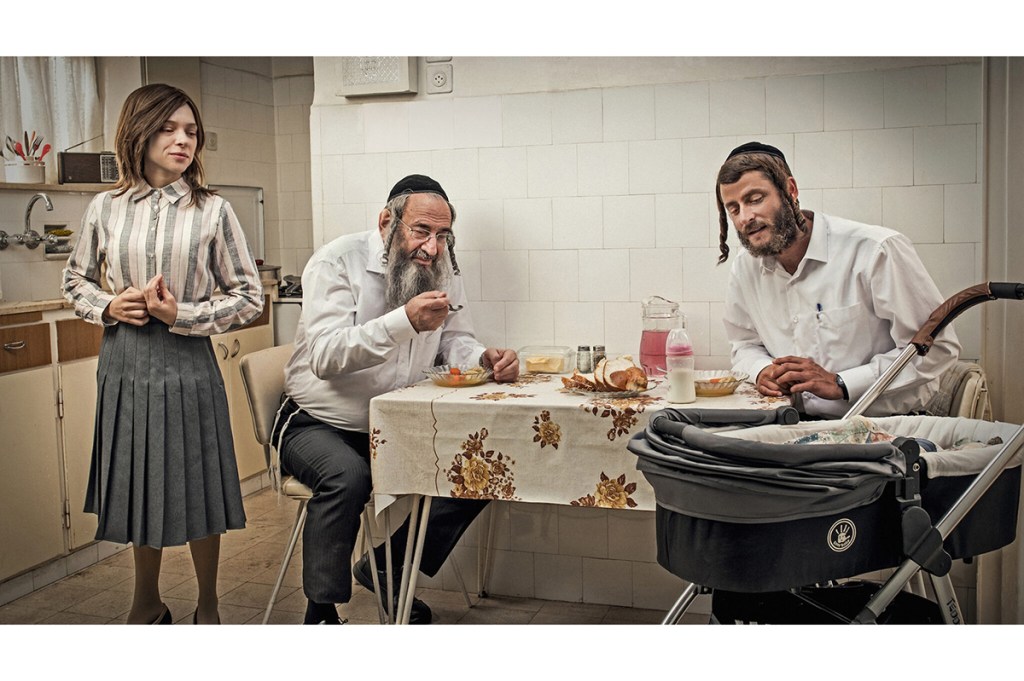As you know, I have previously been mad for all things Israeli and one of my plans had been to go there with my brother Dick and make a fun documentary where we train with the IDF, practice in one of those urban-warfare shooting ranges, learn krav maga, eat lots of Ottolenghi-type food, wallow in the Dead Sea, etc. But I’m afraid I’ve rather gone off Netanyahu’s vax tyranny and just can’t root for Israel in the way I once did. Still, this doesn’t seem to have put me off its TV shows, yet. I’ve just started getting in to Shtisel and the new cop thriller Black Space isn’t half bad either.
Guri Alfi stars as Rami Davidi, a hard-bitten, no-nonsense cop whose unique quirk is that he has an infected glass eye. Sometimes you wish it were otherwise — that he just drove an old Jag and liked opera and a pint, say — because every now and then you wince as his oculist tells him he needs to rest or his socket (thankfully off camera) will start to suppurate. On the whole, though, it doesn’t seem to render him too incapable of spotting clues others have missed, chasing fugitives, beating people up, then getting told by his long-suffering bosses that he has really gone too far this time.
So yes, it’s a bit clichéd. But because it’s only Israeli TV-clichéd rather than UK or US TV-clichéd, it’s much more bearable. For example, though Davidi has a hot, young female sidekick Noga Ruso (Assi Levy), she greets his sexism and machismo with amused tolerance, rather than treating them as disgusting male traits that need to be eradicated. And though she is good at her job, she is not there primarily to remind the viewer that women are a thousand times more omnicompetent than blokes. Rather, she’s there for the contrast, the eye candy and the sexual tension, as is proper.
The series starts with a high-school massacre, which the authorities are at first eager to pin on the Palestinian illegals they find camped on the roof. Davidi, though, who coincidentally is himself an alumnus of the school, has other ideas. He thinks it’s an inside job and of course he’s quite right: there’s some sort of secret society thing going on, with inconvenient pupils being silenced by their peers. Perhaps — I’m guessing because I haven’t got to the end — there’s some connection with those flashbacks where we see young Davidi losing his eye; and to the major-general (I spotted him as a potential wrong’un immediately); and to the creepy-smarmy school principal.
The ‘teens at high school’ element almost put me off continuing. It could be an age thing: when you’ve got early twenty-something children, I find, the last thing you want to watch is still more of them on TV, rutting and whining and emoting and partying and being sullen and secretive. Also, young people all look the same to me and I find them hard to tell apart. And to be honest, if I’m watching an Israeli thriller, I’d rather the baddies were properly evil Hamas zealots than spoilt rich kids acting out a more brutal version of Dead Poets Society.
But it sucks you in effectively enough and with luck I won’t feel quite as cheated by the end as I did after umpteen episodes of the hallucinogenic shaggy-dog drama When Heroes Fly.
I would, however, definitely recommend the long-running series about ultra-Orthodox Jews Shtisel. Because unlike, say, Fauda it doesn’t involve undercover anti-terrorist cops, I was worried that I might be bored by the absence of tension and extreme violence. Actually, though, this is part of its charm. You don’t spend your viewing nights on the edge of your seat scarcely able to breathe as you wonder whether those nice kids who’ve just been captured by Hamas are about to have their heads chopped off. It’s more like: how will Akiva’s first date go with the nice girl fixed up for him by the matchmaker Königsberg; will Grandma be corrupted by all those addictive daytime dramas she’s seeing in her nursing home now she’s got a TV for the first time in her life? It’s like Midsomer Murders, only without the murders, and with broad-brimmed black hats and lots more smoking and coffee. Soothing.
This article was originally published in The Spectator’s UK magazine. Subscribe to the World edition here.

























